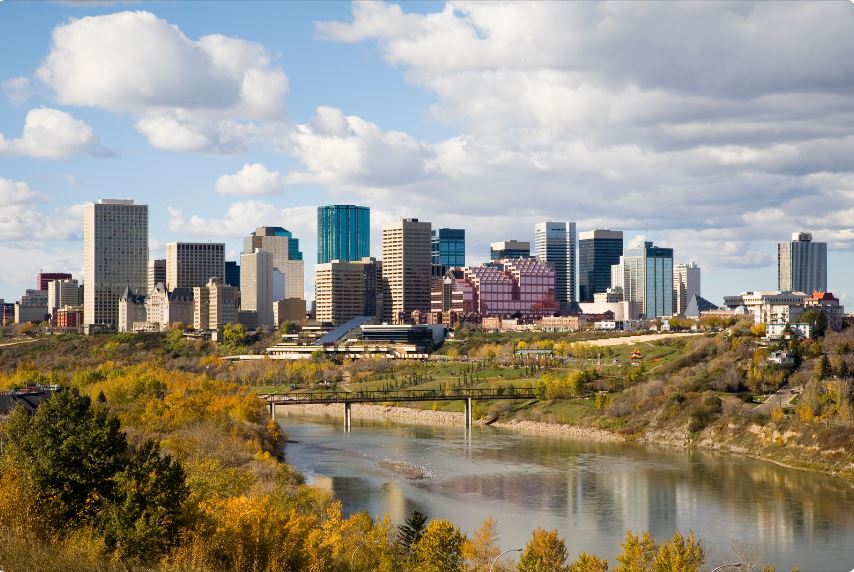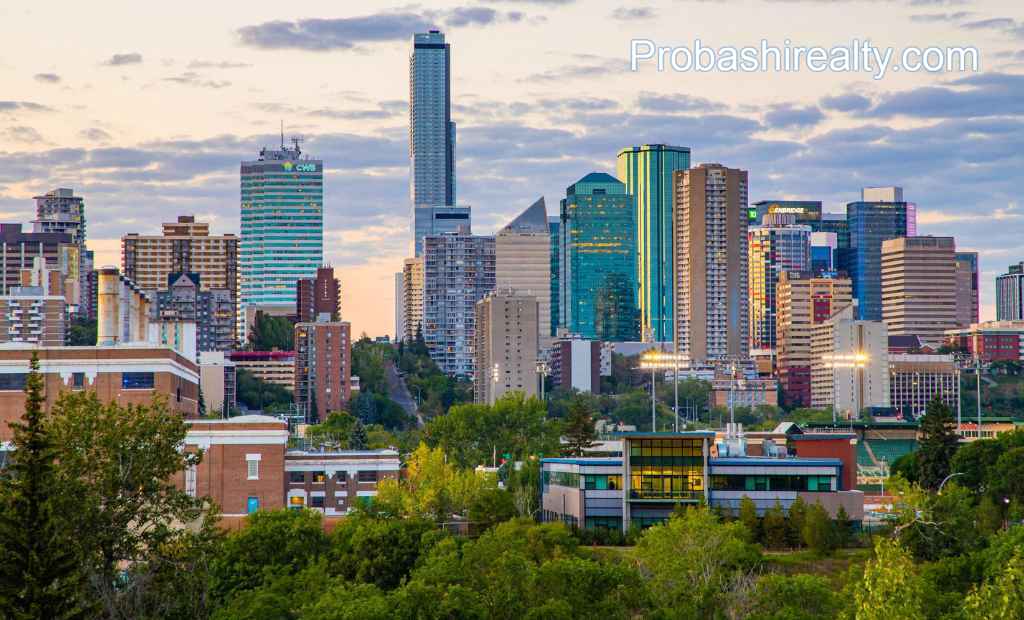Edmonton is the capital city of the province of Alberta, Canada. Located on the North Saskatchewan River, it is known for its natural beauty, cultural attractions, and vibrant economy. Here’s a detailed overview:
Geography and Climate
- Location: Edmonton is situated in the central region of Alberta, roughly in the middle of the province.
- Climate: Edmonton experiences a humid continental climate with cold, snowy winters and warm, sometimes hot, summers. Average temperatures range from about -10°C (14°F) in January to 17°C (63°F) in July.
History
- Founding: Edmonton was founded as a trading post by the Hudson’s Bay Company in 1795.
- Development: It became a city in 1904 and the capital of Alberta in 1905 when the province was established.
- Economic Growth: The city saw significant growth during the early 20th century, particularly during the oil boom of the late 1940s.
Demographics
- Population: As of 2023, Edmonton’s population is approximately 1 million people, making it the fifth-largest municipality in Canada.
- Diversity: The city is known for its cultural diversity, with a significant number of immigrants from Asia, Africa, and Europe.
Economy
- Industries: Edmonton’s economy is diverse, with major sectors including oil and gas, technology, manufacturing, education, and health care.
- Oil and Gas: Often referred to as the “Oil Capital of Canada,” Edmonton is a key player in the oil and gas industry, serving as a hub for the Athabasca oil sands.
Education
- Universities: The University of Alberta, one of Canada’s top universities, is located in Edmonton. The city also hosts several other institutions, including MacEwan University and the Northern Alberta Institute of Technology (NAIT).
Culture and Attractions
- Festivals: Edmonton is known as “Canada’s Festival City,” hosting numerous festivals throughout the year, such as the Edmonton International Fringe Festival, the Edmonton Folk Music Festival, and the Ice on Whyte Festival.
- Museums and Galleries: Key cultural institutions include the Art Gallery of Alberta, the Royal Alberta Museum, and Fort Edmonton Park.
- Theatre and Music: The city has a vibrant theatre scene, with venues like the Citadel Theatre and the Winspear Centre hosting a range of performances.
Parks and Recreation
- River Valley Parks: Edmonton boasts the largest urban park system in North America, with numerous parks and trails along the North Saskatchewan River.
- Sports: The city is home to professional sports teams such as the Edmonton Oilers (NHL) and the Edmonton Elks (CFL).
Infrastructure
- Transportation: Edmonton has a comprehensive public transit system, including buses and the Edmonton Light Rail Transit (LRT). The city is also served by the Edmonton International Airport.
- Healthcare: Edmonton has a robust healthcare system with several major hospitals, including the University of Alberta Hospital and the Royal Alexandra Hospital.
Governance
- City Government: Edmonton is governed by a mayor and a city council. As of 2023, the mayor is Amarjeet Sohi.
- Provincial and Federal Representation: The city is represented in the Alberta Legislature and the Canadian Parliament.
Challenges and Opportunities
- Economic Diversification: While the oil and gas sector remains important, there are ongoing efforts to diversify the economy into technology and other industries.
- Environmental Initiatives: Edmonton is actively working on sustainability initiatives, including reducing greenhouse gas emissions and promoting renewable energy.
Edmonton is a dynamic and evolving city with a rich history and a promising future. It offers a high quality of life, a diverse cultural scene, and a strong economic foundation.

Real estate market in Edmonton
The real estate market in Edmonton is diverse and offers a range of opportunities for buyers, sellers, and investors. Here’s an in-depth look at various aspects of Edmonton’s real estate market:
Market Overview
- Home Prices: As of 2023, the average home price in Edmonton is lower compared to other major Canadian cities like Toronto and Vancouver. This makes Edmonton an attractive option for homebuyers seeking affordability.
- Market Trends: The market has experienced fluctuations, influenced by factors such as economic conditions, interest rates, and the oil and gas industry. Recent trends indicate a balanced market with stable prices and moderate sales activity.
Residential Real Estate
- Single-Family Homes: The most common type of housing, single-family homes are popular among families. Prices vary significantly based on location, size, and amenities.
- Condominiums: Condos are a popular choice for first-time buyers and investors. They offer a lower entry price compared to single-family homes and are often located in central areas with access to amenities.
- Townhouses and Duplexes: These types of properties provide a middle ground between condos and single-family homes, offering more space and privacy.
Neighborhoods
- Downtown: Known for its high-rise condos and proximity to business and entertainment hubs, Downtown Edmonton is ideal for professionals and young adults.
- West Edmonton: This area includes neighborhoods like Westmount and Glenora, which are known for their historic homes and mature trees. West Edmonton is also home to the West Edmonton Mall.
- South Edmonton: Popular neighborhoods in this area include Strathcona, known for its vibrant arts scene and historic buildings, and Windermere, a newer community with upscale homes.
- North Edmonton: Areas like Castle Downs offer more affordable housing options and are popular among families.
Investment Opportunities
- Rental Properties: The demand for rental properties is steady, driven by a growing population and a significant number of students and professionals. Investing in rental properties can provide a stable income stream.
- Commercial Real Estate: Edmonton’s commercial real estate market includes office spaces, retail properties, and industrial areas. The city’s economic growth and diversification efforts present opportunities for commercial investments.
- New Developments: There are ongoing residential and commercial development projects in Edmonton, providing opportunities for investors to participate in the city’s growth.
Market Influences
- Economy: Edmonton’s economy, heavily influenced by the oil and gas sector, impacts the real estate market. Economic downturns can lead to slower market activity, while growth periods can boost demand.
- Interest Rates: Mortgage interest rates significantly affect the real estate market. Lower rates can increase buying power, leading to higher demand and price appreciation.
- Population Growth: As Edmonton continues to grow, driven by immigration and natural increase, the demand for housing rises, impacting prices and availability.
Challenges
- Market Volatility: Economic reliance on oil and gas can lead to market volatility. Diversifying the economy is crucial for long-term stability.
- Affordability: While more affordable than other major Canadian cities, some segments of the population still face affordability challenges, particularly with rising interest rates.
- Supply and Demand: Balancing housing supply with demand is essential to avoid issues like housing shortages or oversupply, which can lead to price fluctuations.
Government Policies and Initiatives
- Affordable Housing: The city and provincial governments have initiatives aimed at increasing affordable housing options for low- and middle-income residents.
- Sustainability: There is a growing focus on sustainable development practices, including energy-efficient buildings and environmentally friendly urban planning.
Future Outlook
- Continued Growth: With ongoing economic diversification and population growth, Edmonton’s real estate market is expected to remain stable and offer opportunities for buyers and investors.
- Technological Integration: The integration of technology in real estate transactions, smart homes, and digital platforms for property management is likely to increase, making the market more efficient.
In summary, Edmonton’s real estate market is characterized by affordability, diversity, and growth potential. It offers a range of options for different types of buyers and investors, supported by a stable economy and proactive government policies.


